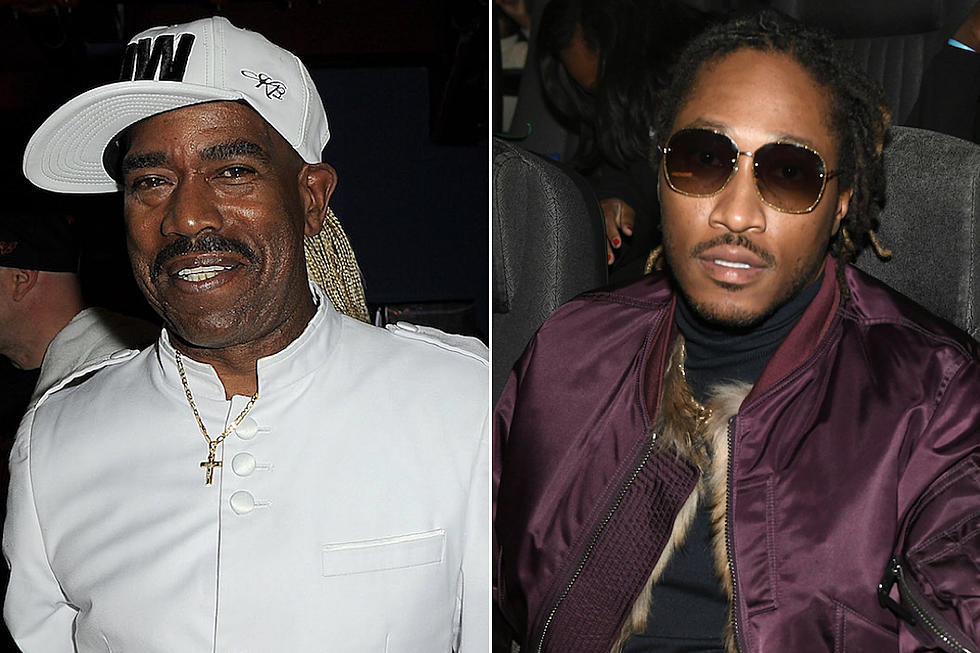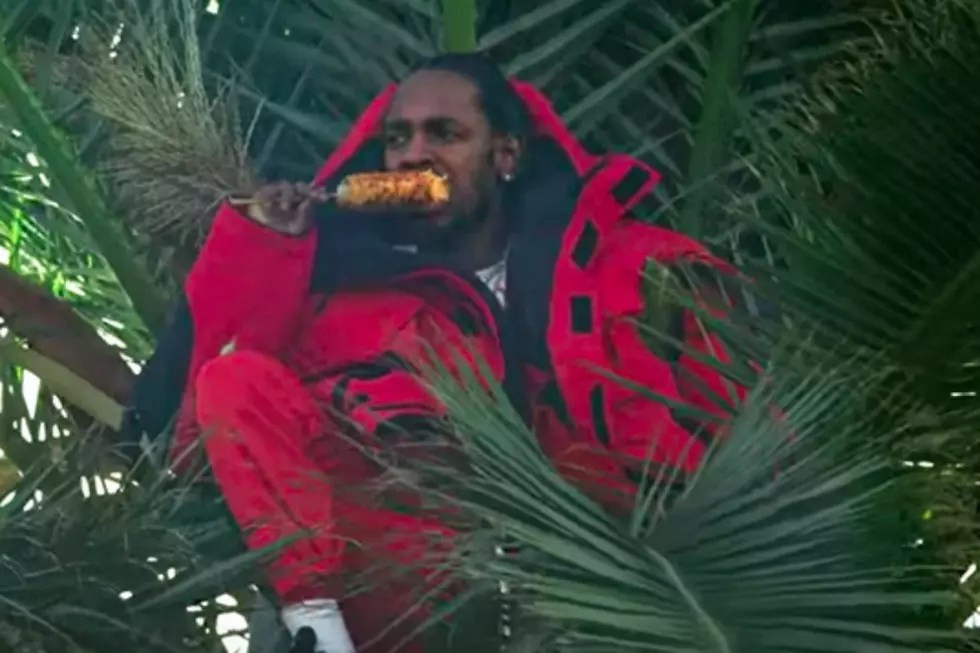![Future, ‘Honest’ [ALBUM REVIEW]](http://townsquare.media/site/625/files/2014/04/Future_Honest_album.jpg?w=980&q=75)
Future, ‘Honest’ [ALBUM REVIEW]
Ask any well-meaning plebeian (hint: you can’t find them on the Internet) what they think about Future’s music and you’ll probably hear at least one thing across the board: “It isn’t rap.” A fan of the ATLien’s music might smile or scream at the sentiment -- what other “rapper” could write a track like 'Loveeee Song' for Rihanna? (The answer is zero, outside of Future’s progenitor Lil Wayne.)
Future is hard to peg down. When he popped into national consciousness with 'Racks,' he was using one specific sound that would come to dominance in other hits of his like 'Same Damn Time' and 'Tony Montana.' It was a technique many have described as being more about the sounds of the repeated words than the words themselves; the choruses get driven into your brain until you have to accept and mimic them. The ripple effect his hooks had on listeners verified the ancient axiom -- “less is more.”
On ‘Honest,’ Future’s second studio album, less is still more, but the emphasis is more melodic and textured than ever before. Gone are the blunt, hammering hooks of ‘Pluto’ (minus 'Move That Dope,' 'My Momma' and 'Covered N Money') in exchange for what made him a star -- the vulnerable, curious, bleeding-heart vocals from ‘Turn On the Lights.’ The outliers on that first album, serenades like ‘Neva End’ and ‘Truth Gonna Hurt You,’ are now the forebearers of songs like 'I Be U' and 'I'll Be Yours' on ‘Honest’ as more rap-centric songs get pushed to the fringes.
In other words, he’s gone pop. ‘Honest’ is a defiant work that proves while he’s filed under “rap” in iTunes, his music eclipses that label. Even an Andre 3000 verse on ‘Benz Friendz’ seems feeble compared to the gigantic steps that Future makes on this album.
Straightforward rap, the kind we come to expect from almost every rap record that isn’t by Young Thug these days, is too terrestrial for Future. The “rap” category feels claustrophobic on Future’s new album, too narrow for an artist of his ambition. Take the opening song, ‘Look Ahead.’ The first thing it does (as a symbol for the album itself) is disorient you -- name a Future song that’s used a vocal sample more prominently than this, and your $1,000 check will be overnighted. Nothing he says on the song will put him in the company of the GOATs, but there also isn’t a single rapper who can make “Good time, n----, good time!” sound more victorious than Nayvadius.
‘T-Shirt’ will be the most forgotten song on this album for all the wrong reasons. Early fans will get down on hands and knees to thank the Lord for a Nard & B beat, but the song is a throwback -- explicit evidence that Future hasn’t totally changed since his mixtape days. ‘T-Shirt’ could belong on 2011’s ‘Streetz Calling,’ which balanced street anthems with a pop sensibility on cuts like ‘Running Through A Check,’ ‘Unconditional Love’ and ‘If You Knew What It Took.’ Don’t trust anyone who downplays ‘Honest’ for its blatant crossover appeal -- they haven’t been listening closely in the past.
Sandwiched between the adrenaline of ‘T-Shirt’ and ‘My Momma’ (whose hook will ring the f--- off in clubs), ‘Move That Dope’ is actually underwhelming. Everyone jumped on that bandwagon for Mike WiLL Made It’s astronautical production and Pharrell’s naked yoga, but the beat gurgles while songs like ‘Honest’ and ‘How Can I Not’ soar.
‘I Won’ showcases Future’s development -- the song's chorus goes beyond the mere repetition of “young n---- move that dope” with a garden of little eccentricities (the high-pitched Auto-Tune writhing in the background, the melody of how he says “I won me a trophy,” the irresistible murmur of “I won, I won, I won, I won” that he does only twice). If you can get past the admittedly disgusting allusions to love as custody and women as prizes, ‘I Won’ is one of Future’s most musically mature (and complex) records to date.
That song brings an uncomfortable truth to light. On ‘Honest,’ Mike WiLL faces his second coup after DJ Mustard ousted him from the charts. While Future still finds chemistry with his go-to producer on burners like ‘Never Satisfied’ and ‘Sh!t,’ it’s Metro Boomin’ beats that sound best under Future this time. ‘Karate Chop’ deserved a bigger push (sans Lil Wayne) but still crushes and ‘How Can I Not’ is a sleeper bonus track now mixed to perfection. The melodrama that Metro’s keys bring to a track and his diversity of sound (which Mike WiLL demonstrated on 'Pluto') is what makes ‘Honest’ a special listen. Future is broadening every facet of his scope while still nailing the types of songs that got him to this point.
Future is to rap as Jackson Pollack was to painting -- an artist using his expressive tools to do something groundbreaking in an age-old medium. Future twists his voice to perform, or simply to reveal, the emotion underneath his songs. His success can be explained by his hit-making ability -- he is the go-to hip-hop hook dude -- but his sustained popularity amongst a core group of fans is unshaken for the same reason rap lyrics aren’t inspiring on paper. Rap and poetry aren’t equivalent because rap needs a performer/messenger who can emote the pain, the desperation, the suffering, the jubilance, the defiance, i.e., the experience behind the story being told. The technical ability of breath control, punchlines and syllabic placement means little if the person employing those skills sounds puny, flat or nondescript. It really is mostly the voice.
Future doesn’t have the best voice. If he did, he could have gone on ‘The Voice,’ destroyed every competitor, gotten a label deal and promptly vanished from the public eye. Great artists don’t submit themselves to a panel so they can be told what’s right and what’s wrong. That seems boring and predictable. The artists that fascinate us don’t follow the rules, they break them. The same can be said for activists, authors, directors, athletes -- you name it. Clinton committed a no-no and saw his approval ratings soar. Godard used a handheld camera and started a New Wave of French cinema. A.I. donned cornrows, broke MJ’s ankles and became the new face of the NBA.
In 2011, Ben Westhoff ended 'T-Pain and His Florida Hitmakers,' an essay in defense of T-Pain, this way: “[T-Pain’s Auto-Tune] app sold well, but Auto-Tune’s novelty and mystique were starting to fade. Now that anyone could do it, it no longer sounded like the future.” What Westhoff leaves out is before T-Pain blew up, anyone and everyone “could” already use Auto-Tune; it was how T-Pain used it, combined with his songwriting chops, that made him so popular. To tie his success to the “mystique and novelty” of Auto-Tune, as the author implicitly does, is a false revision of history.
Don’t do the same thing with Future, unless you want to be on the wrong side of history. Auto-Tune is but one means that he uses to communicate from his tortured soul. He’s private, almost shy (“I don’t really let people into my world … You can’t just let everybody know everything about you,” he told FADER) yet often angrily animated (‘My Momma’) and always willing to experiment (‘I Be U,’ which evokes ‘808s & Heartbreaks’). Even the strings on a song like ‘Special’ are hard to come by in today’s anti-acoustic rap atmosphere (808 Mafia did the track, but it wouldn’t be shocking if Organized Noize consulted on the beat). “I wish you could feel all my momma pain,” he says on album closer ‘Blood, Sweat, Tears,’ a track that forgoes lyrical prowess in exchange for an Auto-Tune-less voice that vaults over mountains.
Meek Mill screams and Drake whimpers, but there isn’t a verb in the English language to accurately describe what Future does. He croons, he croaks, he bleats, he sings, but none of those words convey the essence of what you hear when his voice cracks through your headphones. He’s gone entirely rogue and in a country that loves an anti-hero, Future is our brightest star.
More From TheBoombox





![Beyonce Is Playing No Games on DJ Khaled’s New Song ‘Top Off’ Featuring JAY-Z and Future [LISTEN]](http://townsquare.media/site/625/files/2018/03/khaled-beyonc-ejay.jpg?w=980&q=75)



